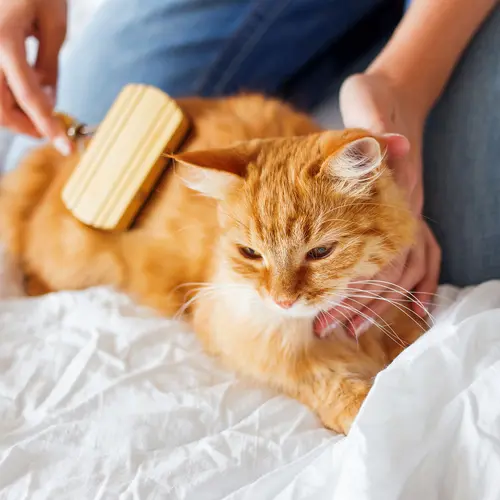All cats are going to throw up every once in a while, but a common misconception is that vomiting is normal behavior for cats. If your cat is throwing up more than once a week, or even consistently every few weeks, you should see your vet. Frequent or repeated vomiting is not normal behavior for your cat.
Cats can get an upset stomach for many reasons. If your cat vomits often, make an appointment with your vet to find the underlying cause. Your cat may be regurgitating their food, coughing, or having a reaction to something they've eaten. It's important to keep an eye on them and make sure they haven’t come in contact with a toxic substance or have something lodged in their throat.
Why Do Cats Throw Up?
Cats may throw up even when they’re not sick. If your cat throws up right after eating, they may be eating too much or too fast. They might be reacting to a change in their diet, or they might have eaten something they shouldn’t have like a rubber band or piece of string.
Hairballs could be to blame, too. Longhair cats or cats that groom themselves often can get wads of fur stuck in their stomachs. It’s ok for your cat to throw up a hairball every week or two to avoid blockages in their intestines. Passing hairballs should not be painful for your cat, though. To make it easier, you can brush your cat’s fur regularly or give them over-the-counter supplements.
Other more serious conditions that can cause your cat to vomit include:
- Foreign objects in their digestive tract
- Food allergies
- Poisoning
- Intestinal Parasites
- Inflammatory Bowel Disease
- Diabetes
- Hyperthyroidism
- Kidney Disease
- Cancer
These conditions can be life-threatening, but early detection and treatment can help your cat live a long, healthy life.
Signs to Look for in Your Cat
Your vet will ask for a thorough history of your cat’s health and behavior. Before your visit you’ll want to look for the following in your cat:
- Lethargy or depression
- Change in appetite or eating habits
- Weight loss
- Blood in their vomit
- Pain in their abdomen (if they react harshly when you touch it)
- Frequency of vomiting
- Change in diet
- Access to plants or other foods or substances
- If other cats or animals are affected in your household
This will help your vet determine if your cat needs more tests or blood work.
How to Know if Your Cat Is Throwing Up
Your cat can get nauseous before they throw up. They can be restless, salivating, or repeatedly swallowing. Vomiting starts with intense contractions in your cat’s abdominal muscles. They then expel what’s in their stomach or throat.
Coughing in cats can look similar to throwing up. When a cat coughs, they’ll crouch down on all four legs and stretch their neck out. They then cough up froth or foam, which they might swallow again immediately.
There’s also a difference between regurgitation and vomiting. Regurgitation takes your cat less effort and usually doesn’t involve abdominal contractions. Regurgitation often happens right after eating or drinking and may be a sign of a problem in the cat’s esophagus.
Showing your vet a video of your cat vomiting can help them differentiate between vomiting, coughing, and regurgitating.
Treating Your Cat for Throwing Up
If your cat is vomiting because of hairballs, try switching their food to one with a hairball formula. Cat food with hairball formula helps prevent hairballs from forming by breaking them down with specific enzymes.
If your cat is throwing up because they are overeating, you may need to monitor and change how much food you’re giving them. You can buy a bowl that makes your cat work for their food and eat slower. You can also try giving your cat smaller portions more frequently through the day.
However, if your cat is throwing up several times a day or multiple days in a row, they may have another health issue that needs to be treated by a vet. Your vet will run tests to identify the underlying condition and may prescribe medication to treat it.
Preventing Your Cat From Throwing Up
Cats are curious creatures, and they can accidentally get into things that make them sick. It’s best to keep toxic plants, human medications, yarn or string, chocolate, or other small objects out of your cat’s reach. They may eat or swallow these items and cause digestive complications.
If your cat vomits frequently, you’ll want your vet to diagnose the underlying causes. It’s best to not hesitate to take your cat to the vet if you suspect they are sick.
